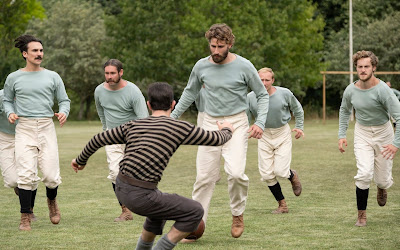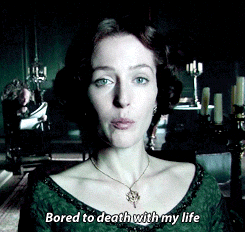The English Game
The previews and promo images for this show include women in bustles which made me think I would like it. Also: Old-timey sports fashion! Class conflict! What looks like the same mill where North & South was shot! It is about football (I think the "soccer" kind of football but not 100% sure) but I stupidly was like "maybe there won't be so much of that."
I made it to the first game (match?) and remembered something about sports-focused movies/tv. They aren't just going to talk about the sport and do some sports things briefly. The whole show will hinge on long game scenes in which each play is important and you have to focus because some detail of what happened will shape the characters and their motivations I was just like...
My recommended fix:
Less sportsball. More bustles. Or maybe change the sport to something women can play while wearing bustles? I guess what I really want is an extended version of the archery scene in Daniel Deronda.
YEP, THIS IS IT
Turn: Washington's Spies
I keep seeing this on the list of historical shows on Netflix (yes, the Netflix algorithm gives me a "historical TV shows" category) and finally I gave it a shot.
Why I thought I might like it:
- As has already been documented, I enjoy the fancy jacket and knee pants look of 18th century menswear. This promised to have lots of that.
- J.J. Field is in it and he is delightful
- History stuff
- The first episode had a content warning for sex but not violence so that seemed promising
- Stories about wars and battles
- Shows where most of the cast are men and all the main storylines are about men
- Stories where characters are constantly in tense and dangerous situations
Recommended fix:
Is there a way to make a show with a bunch of military uniforms that isn't like, about a war? Or about the British army but somehow not be super problematic and colonialist? Maybe a show where J. J. Field's character clips off the braids and goes around the country saying nice things to ladies in that Alan Rickman deep voice he has?
Maybe he can talk about muslin
Ok, my bad on the other shows, but this one really should have been up my alley. Dickensian takes a bunch of characters from Charles Dickens books and puts them together for a new story. I mean, I seem like the exact target demographic for that.
I gave this a two-episode try, but finally had to admit that I wasn't enjoying it all and didn't look forward to anything about how it would unfold. The main problem was that it was a prequel to the action of the books where all these characters appear. In the first episode there was this young woman named Amelia whose father had died, and she seemed like she was going to be one of the lead characters. Only near the end of the first episode do we learn her last name: Havisham.
Uh oh
I know that origin stories are hot these days, but it does take some of the suspense out of it. This gal is going to fall in love and it isn't going to go great.
But it will be Goth AF
The same goes for the other leading lady. Her name was less familiar, but some internet searching and I realized she was the future Lady Deadlock from Bleak House. Ah ok. So I now know exactly how her story will play out.
She ends up very happy and fulfilled
The inevitability just seemed to take all the fun out of it. Plus, there wasn't much fun to be had in the first place. The show interpreted "Dickensian" to mean "dark and gritty" without much joy and humor also found in his stories. Watching the rest of the episodes seemed like a slog.
Recommended fix:
Why do a prequel? Why not connect all these characters after the main action of their stories and have them all go in surprising and unexpected directions? You could start where Our Mutual Friend leaves off (the final completed novel) with the enigmatic Mortimer Lightwood walking off into the night. Mortimer spends most of Our Mutual Friend being detached and sardonic, but he is also shown to be compassionate and kindhearted. He is observant, critical of the follies of London society, unmarried, and you can reasonably interpret him as gay or bi. Wouldn't he be an interesting character to follow into a new story?
For the record this is a legitimately good idea.




























